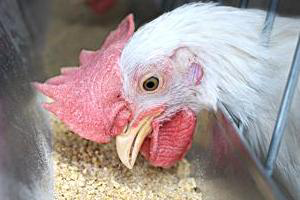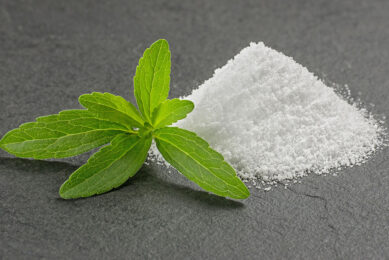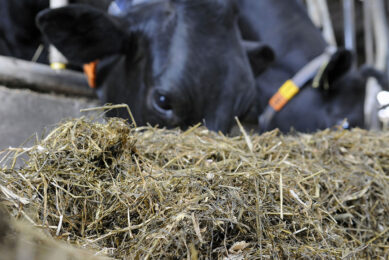Multiple enzyme aids soybean digestibility

Researchers of Adisseo explain that, even if soybean meal is included in most animal diets as a protein source, it brings a significant part of the energy supply. A multiple enzyme can help releasing more energy from this ingredient.
For instance, soybean meal provides more than 25% of the total metabolisable energy in a broiler diet. As NSP content of soybean meal is twice that of the corn or wheat NSP content, the use of NSP enzymes on soybean meal is therefore crucial, especially with rising prices.
Rovabio, the versatile enzyme of Adisseo, is particularly efficient to increase dry matter and energy digestibility of soybean meal and enhances the access of natural proteases to dietary proteins.
To increase dry matter and energy digestibility of soybean, a wide range of enzymes are required, as NSP in soybean meal are complex.
Aurélie Preynat, Enzyme Research Manager Adisseo, explains: “NSP in soybean meal can be divided into insoluble NSP, mainly cellulose, and soluble NSP, composed mainly of pectic polymers. The main feature is the high content of pectin, and in particular, rhamnogalacturonans which are very complex. They present specific structures composed of complex backbone of galacturonic acid and rhamnose, and a high number of substitutions. Therefore, a large spectrum of pectin degrading enzymes is needed to hydrolyse NSP from soybean meal.”
Four enzymes required
Knowing that, in soybean meal we also find hemicelluloses (mainly galactomannans), of which the amount depends on soybean quality, at least four enzymes are necessary to breakdown such carbohydrates: α-galactosidase, β-mannanase, β-mannosidase, and acetyl mannan esterase.
Table 1: NSP content in main cereals and soybean meal (SBM). Sources: Bach-Knudsen, 1997 ; Huisman et al., 1998
%DM | Carbohydrates | Corn | Wheat | Barley | SBM | Enzymes needed |
Total NSPs |
| 9.9 | 11.9 | 18.7 | 21.9 |
|
| Arabinose | 2.2 | 2.9 | 2.8 | 2.6 |
|
Arabinoxylans | Xylose | 3.0 | 4.7 | 5.6 | 1.9 | Xylanases |
| Uronic acid | 0.7 | 0.4 |
| 4.8 |
|
| Mannose | 0.3 | 0.3 | 0.4 | 1.3 | Mannanases |
Pectins | Rhamnose | – | – | – | 0.3 | Pectinases |
β-glucans | Galactose | 0.5 | 0.4 | 0.3 | 4.1 |
|
| Glucose | 0.1 | 0.8 | 4.2 | – | β-glucanases |
Cellulose | Glucose | 2.2 | 2.0 | 4.3 | 6.2 | Cellulases |
“Rovabio which contains a large number of fibre-degrading enzymes is particularly adapted to improve soybean meal nutritional values. Because the enzyme is produced from a non GMO fungus, it contains more than 200 proteins, with 19 identified as NSP degrading enzymes.” says Aurélie Preynat.
“Occasionally, proteolytic activities are added to diets containing soybean meal, but in vivo responses reported from literature are divergent (Adeola and Cowieson, 2011), probably because the effect of these proteases is more to destroy or inactivate the anti-nutritional factors than to provide extra protease activity to the animal.”
Several in vivo trials confirm the positive effect of Rovabio on metabolizable energy of soybean meal.
More kcal/kg
Caroline Joos, Regional Technical Manager in Central Europe for Adisseo calculates that, on a typical corn soy-based diet containing 60% of corn and 30% of soybean meal, Rovabio increases the energy level by 65kcal/kg, with about 50% coming from corn (3,400kcal/kg and + 1.5 %) and 50% from soybean meal (2,400 kcal/kg + 4.5%).
Improvement of metabolizable energy of soybean meal with the multiple enzyme has been demonstrated through several in vivo trials with various poultry species (broilers, layers, turkeys, and ducks) achieved in the Adisseo Research Centre in France (CERN).
The multi-enzymatic complex, leads to more efficient improvement of digestibility of a corn-soybean diet than a mannanase alone. Metabolizable energy is improved by + 82kcal/kg (vs. + 34 kcal/kg) on broilers, and + 55kcal/kg (vs.0) on layers. Another trial confirmed that Rovabio is also more efficient to improve AME in broilers than a pectinase alone (+ 96kcal/kg vs. + 23kcal).
NSP degradation
Dr. Kevin Liu, from Adisseo Singapore achieved a study in the Philippines in 2005 to compare the efficacy of four NSP degrading enzyme products on growth performance of broilers fed with diets containing protein from only soybean meal (14% crude protein, 3,200kcal/kg). Compared with the control diet, Rovabio improved weight gain by +6.8 % and feed conversion by –5.3% (P<0,05), while the other competitive enzymes failed to improve bird performances.
Furthermore, we know that animals naturally produce enough endogenous proteases to degrade the soybean meal proteins. These endogenous proteases have difficult access to them when encapsulated by NSPs. Rovabio, efficient on these NSPs, enhances the access of proteases to soybean proteins, and leads to a better protein and amino acid availability.
All this data proves that Rovabio is effective in degrading the soybean meal, which is the most expensive feed ingredient of the three major raw materials in monogastric diets (with corn and wheat).
Degrading the NSPs in soybean meal, and increasing its nutritional values is more and more cost effective, as soybean prices have trended strongly upwards these last months. John Geuss, Regional Marketing Manager North and Central America for Adisseo USA, calculates that, with increasing prices of soybean meal, the return on the cost of Rovabio is at least five to one.
Join 26,000+ subscribers
Subscribe to our newsletter to stay updated about all the need-to-know content in the feed sector, three times a week. Beheer
Beheer









 WP Admin
WP Admin  Bewerk bericht
Bewerk bericht